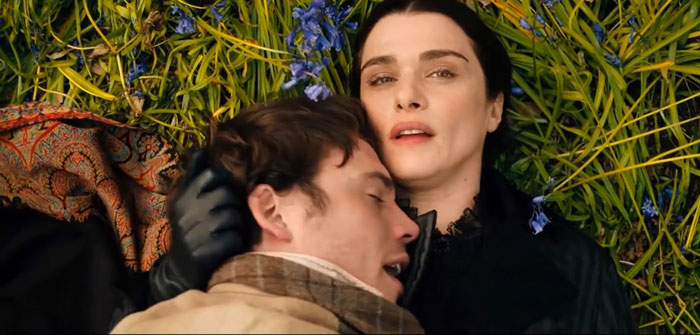<p>Having seen a number of period films set in Victorian England, I have admittedly allowed them to blend together, forming something close to a bizarre, over-dramatic vision of what that era must have been like. More importantly though, this over-saturation of the time period has caused these films to blend together aesthetically as well, to the point that few stand out among the pack. Whether they fit into the horror, thriller, or more straightforward romance genre, they all generally tread over the same familiar territory: the protagonists come from wealth and inhabit a large estate, there is almost always some kind of romantic entanglement, and (not surprisingly) there is a hefty emphasis on the relative austerity of the times, as if one is likely to confuse it with the present. In <em>My Cousin Rachel</em>, all of these criteria are met, and not much has been adjusted to make the film unique in any meaningful way.</p>
<p>The film, based on the novel of the same name by Daphne du Maurier, follows Philip (Sam Claflin), a man who was adopted and raised by his cousin Ambrose. Years later, after Ambrose has moved to Florence, Philip finds out that Ambrose has married his cousin Rachel (Rachel Weisz). When letters reveal that Ambrose is in failing health and disapproves of his treatment, Philip travels to Florence, only to discover that his cousin has already succumbed to his illness, while Rachel is nowhere to be found. Determined to exact revenge on the woman he believes wronged Ambrose, Philip waits for her at his late father’s estate in Cornwall, but is shocked when he quickly develops feelings for Rachel upon her return.</p>
<p>Naturally, the plot continues to evolve from that point, becoming part mystery thriller, part unsettling romance. For this alone the film distinguishes itself to a degree, but the story only goes so far in this respect. Initially, <em>My Cousin Rachel</em> does an incredibly subpar job at explaining itself to the audience. The various relationships are not very clear; for example, it took me about halfway through the film before I realized who Rachel had actually been married to, as well as the nature of her relation to Philip. The relationship between Ambrose and Philip, which serves as the foundation for the rest of the story, is also quickly glossed over for the sake of expediency. Additionally, there are moments that are artlessly ambiguous, such as when it is vaguely alluded to that Ambrose may have been a homosexual, and then this is never really addressed again in the film.</p>
<figure id="attachment_1310" aria-describedby="caption-attachment-1310" style="width: 850px" class="wp-caption aligncenter"><img class="wp-image-1310" src="https://philosophyinfilm.com/wp-content/uploads/2018/01/b88758877z1_20170518123106_000g1dkjl532-0-uvh6ahx4yu9luzab9o2_t620-300x174.jpg" alt="My Cousin Rachel mourning" width="850" height="492" /><figcaption id="caption-attachment-1310" class="wp-caption-text">My Cousin Rachel (2017)</figcaption></figure>
<p>All of these poor characterizations and inadequate accounts serve to undermine an otherwise intriguing plot. However, there are other issues that plague the narrative, though they are generally less egregious. When one watches a generic horror film, it is expected that some characters will make bad decisions, and the audience will have to watch as the characters meet their fate as a direct result. The time between such a decision and its ultimate consequence produces a certain amount of anxiety and, depending on the foolishness of the act, even frustration. This sensation, when taken out of the context of a horror film, is much more likely to cause audiences to be so annoyed with the character’s ignorance that they are drawn out of the story and cease to enjoy it. This is the feeling I kept coming back to throughout <em>My Cousin Rachel</em>. Philip consistently makes choices that, given the information we are provided with, seem in complete opposition to his own interests. This works to increase the film’s effect insofar as it is a thriller, but it does so at the expense of its own enjoyability.</p>
<p>In all fairness, <em>My Cousin Rachel</em> is not a terrible film; it is certainly flawed, and I would definitely call its overall entertainment value into question, but it tells a story that is, in theory, interesting. However, as the movie plods along, some parts become increasingly unbelievable, and do not warrant further analysis.</p>
<p>That said, much of the film is quite well-done, and at the very least on par with so many other films of that ilk. Visually, the tone matches the darker aspects of the narrative, and Weisz recreates an enigmatic and polarizing character in Rachel. Up until the very last moments, it is hard to decipher if she is a villain or a victim, and this is perhaps the only instance of ambiguity that the filmmakers get right.</p>
<p>Rating: ★★ out of 5</p>
<p><em>My Cousin Rachel</em> is available to purchase via Amazon <a href="https://www.amazon.com/gp/product/B072JL1961/ref=as_li_qf_sp_asin_il_tl?ie=UTF8&;tag=mjones34880c-20&;camp=1789&;creative=9325&;linkCode=as2&;creativeASIN=B072JL1961&;linkId=4f4713821eacf55a9ede2431ce5b2035">here</a>.</p>

Review: My Cousin Rachel (2017) ★★

